How to Deal with Emotional Eating

We’re constantly told that emotional eating – or eating to soothe, suppress or distract from negative or positive emotions including stress, boredom, sadness, anger, excitement or happiness – is a problem and in order to be healthy or have a good relationship with food, we need to stop doing it. But in reality, emotional eating isn’t all bad. Learn more about how to deal with emotional eating, plus tips for cultivating other coping skills.

Despite what you hear and read, emotional eating is not a bad thing. I mean c’mon, eating is emotional. Food is not just nutrition and fuel for our bodies; it is part of our history, our culture, our family. Food is something that is meant to be enjoyed for the taste and pleasure it brings us, not for the vitamins, minerals or fiber it provides. Cooking, baking, and eating are all ways in which we connect with others and care for ourselves and for the people we love.
But emotional eating may become a problem if:
- It’s your only coping mechanism
- It’s not actually helping you to cope and process your emotions and stress
- If you feel guilty and ashamed anytime you eat to cope with stress. That guilt creates a stress response and keeps you trapped in the vicious emotional eating cycle: You feel guilty and ashamed for emotional eating, so you continue to emotionally eat.
Before we dive more into that, let’s first talk a bit more about the importance of coping mechanisms. These are the strategies or activities that you use to deal with and process your stress and other emotions.
Positive coping mechanisms can include physical activity, sleep, reading, writing, drawing, getting outdoors, spending time with friends, doing chores and yes, eating. Food has an impact on the way we feel, which means it is a totally natural thing to use as a coping mechanism. And I’m not just talking about healthy foods here, but any food that helps you feel better. My go-to emotional eating foods are chocolate chip cookies and chocolate peanut butter cups (which are even better when paired with a glass of red wine).
Negative coping mechanisms, on the other hand, can include drug or excessive alcohol use. Dieting, too, is a negative coping mechanism, but an all too common one because we are told that making our bodies smaller will lead to happiness, success, love and acceptance. In reality, dieting and restricting food does the opposite: It strips all the pleasure away from food and makes us unhappy.
So while eating to cope with stress isn’t the worst thing, if it’s the only coping mechanism you have this can be harmful.
If you find yourself frequently turning to food to numb your feelings and emotions, try some of these tips:
1. Cultivate multiple coping skills. Come up with several different coping skills that you can call upon during times of stress or anxiety this holiday season. Coping mechanisms can fall into several buckets including connection, action, soothing or pleasure – my friend and fellow non-diet dietitian Rachael Hartley has an awesome post on this: How to Build a Self-Care Toolbox. Make a list of several different coping skills that you can call upon when needed. The skill you use may vary depending on the situation, and it will take some trial and error to figure out which work best for you. For example, my coping skills include:
- Connection: Calling my mom, going out to dinner with a friend or talking to my niece and nephew on FaceTime.
- Action: Going for a walk, lifting weights, taking a yoga class, having a good cry or doing my laundry (yes – chores count!).
- Soothing: Listening to music, watching “Sex and the City,” or reading a book.
- Pleasure: The aforementioned chocolate chip cookies and peanut butter cups, a glass of wine, a latte from my favorite coffee shop or wearing my favorite comfy sweater.
2. Be intentional when you use food to cope with stress. When food is used to numb or avoid a feeling, eating becomes mindless, without enjoyment. This makes it an ineffective coping skill and won’t help you feel any better. Instead, slow down and pay attention. Make eating an active choice. Think about what food will make you feel better at that moment. Use all your senses to smell, taste and savor that food. This will help you use food and the act of eating in a positive way to feel better, without a side of guilt.
3. Keep a gratitude journal. Take three minutes every morning or evening to write down three things you’re grateful for and at least one positive thing that happened that day. Try this for a week and I can guarantee you’ll have a more positive mindset.
4. Don’t skip meals. Skipping meals sets you up for fluctuating blood sugar levels, which can make the stress response even worse. Instead, aim to eat balanced meals every four to five hours to keep your blood sugar stable and your energy level up.
5. Try meditation. Spending just a few minutes per day meditating or practicing deep breathing can help you feel calmer and lower your stress response. Meditation is simple and can be done anywhere. Try downloading an app like Headspace or Calm and listen to a short guided meditation.
6. Listen to music. Music can have a relaxing effect on our minds and bodies, slowing down our pulse and heart rate, lowering blood pressure, and decreasing levels of stress hormones. When you’re starting to feel stressed or overwhelmed, turn on some of your favorite songs.
7. Accept help. Asking for help isn’t a sign of weakness, but strength. It’s not realistic to expect that you can do everything yourself, so reach out to your friends and family and ask for help when you need it.
8. Learn to say ‘No’. With the holiday season in full swing, no doubt you’ll be invited to multiple parties, events and celebrations. Don’t feel like you need to say yes to all – prioritize which ones are the most important to you. If you’re saying yes because you feel like you not should, not because you actually want to attend, that is a good indication that you should RSVP no.
Are you interested in learning more about intuitive eating?
Check out my Unapologetic Eating 101 Course, an online, self-paced program to liberate yourself from dieting and make peace with food and your body.
My team and I also offer virtual one-on-one support – you can check out our virtual intuitive eating nutrition coaching packages.
My book, Unapologetic Eating: Make Peace with Food and Transform Your Life, is also a great resource that includes information, research, and reflection prompts to help you move away from dieting and come back home to your body, so you can live your most unapologetic, liberated life.
Author Bio
This article was written and reviewed by Alissa Rumsey, MS, RD, CSCS, a registered dietitian and Certified Intuitive Eating Counselor. She specializes in weight-inclusive care, intuitive eating, body image healing, mindfulness, self-compassion, and healing from chronic dieting, disordered eating, and eating disorders. Alissa holds a Bachelor’s Degree in Nutrition and Exercise Science, and a Master’s Degree in Health Communications, and is also an NSCA Certified Strength and Conditioning Specialist.
2 Comments
Leave a Comment
share the love

about
Alissa Rumsey, RD.
Alissa Rumsey, MS, RD, CDN, CSCS (pronouns she/her/hers) is a registered
dietitian, nutrition therapist, certified intuitive eating counselor, and the author of
Unapologetic Eating: Make Peace With Food and Transform Your Life. Alissa is
passionate about helping people reclaim the space to eat and live,
unapologetically.
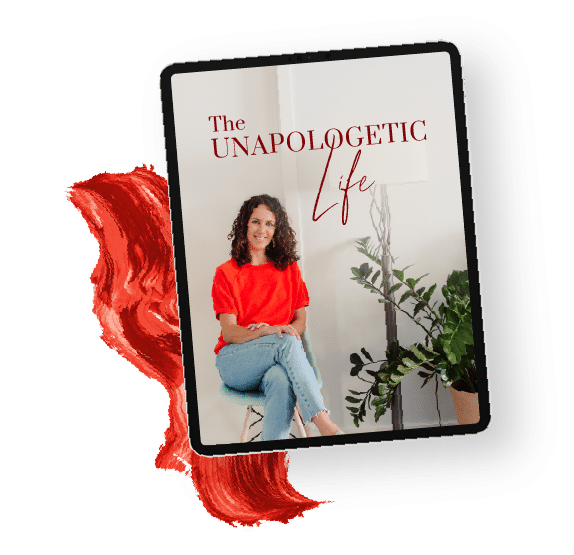
A twice-a-month round-up of inspirational stories, lessons, practical tips and encouragement for living your most authentic, unapologetic life.
The Unapologetic Life
RECENT POSTS

The Unapologetic Life
A twice-a-month round-up of inspirational stories, lessons, practical tips and encouragement for living your most authentic, unapologetic life.






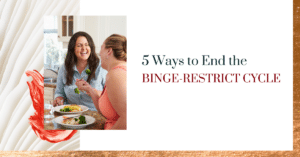
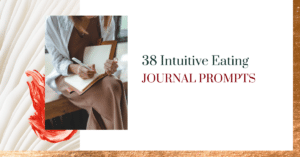
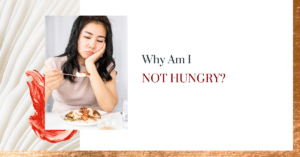
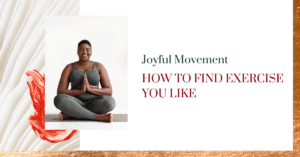
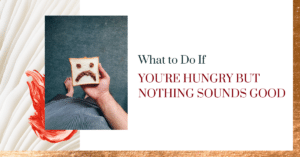
I have been eating intuitively for over a year now and love it, but I still struggle with two areas I do not see addressed in your blog: fatigue eating and distracted eating. These issues arose postpartum and have improved as my children are no longer breastfeeding and (nearly always) sleep through the night. I get plenty of sleep. I’m working on expecting less of myself and resting more. Any other tips against fatigue eating? With regards distracted eating, I find family meals hard since I’m policing the kids’ manners. Frankly, meal times are stressful. All these issues resolve when I’m alone. Should I forego family meals until the kids are older and eat alone/with my husband later? Or do you have tips for keeping family meals intact while being more mindful of my eating habits?
Hi Heather, thanks for your comment! It’s great to hear how intuitive eating has helped you. I’m not sure how old your kids are and what is happening during meals. I’m sorry it’s causing you so much stress. Using Ellyn Satter’s Division of Responsibility can be helpful in terms of structure and ensuring they also get to practice their intuitive eating skills: https://www.ellynsatterinstitute.org/how-to-feed/the-division-of-responsibility-in-feeding/. This framework states that the parents decide what, when, and where meals are served and the child decides if and how much they will eat. Satter has more tips for feeding kids at different ages. Depending on how old your kids are, they may be exploring food and playing with it. You can try to set boundaries as to what kind of play is acceptable vs. not (like throwing food). If a child crosses the line, it may mean they’re done eating and can be removed from the table. Some parents find it helpful to lay down some paper/towels around the area the kids are eating to make cleaning easier. There are lots of benefits to having family meal time (i.e. your kids seeing how you and your husband eat – manners, intuitive eating skills, and foods you eat, etc.), but I also know how stressful it can be and you need to do what is best for you and your family. If you need more support, I would recommend working with an intuitive eating trained dietitian who works with family feeding. I have two on my team who do this work (Christine and Jasmine), please reach out if there is anything else we can do to support you: hello@alissarumsey.com.